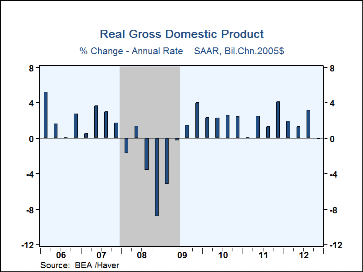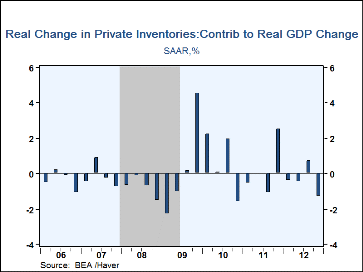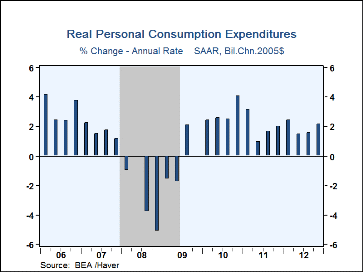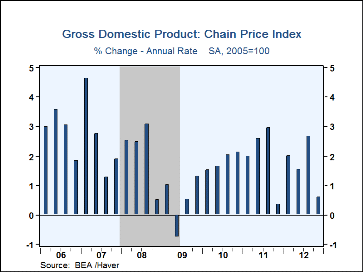 Global| Jan 30 2013
Global| Jan 30 2013U.S. GDP Dips Due To Lower Inventories & Defense Spending; Prices Moderate
by:Tom Moeller
|in:Economy in Brief
Summary
The economy felt the full effect of businesses' efforts to reduce inventories last quarter and lower defense spending. Real GDP fell 0.1% (AR) in Q4'12 (+1.5% y/y) following an unrevised 3.1% rise in the third quarter. It was the [...]
The economy felt the full effect of businesses' efforts to reduce inventories last quarter and lower defense spending. Real GDP fell 0.1% (AR) in Q4'12 (+1.5% y/y) following an unrevised 3.1% rise in the third quarter. It was the first decline in activity since Q2 of 2009. A 1.2% increase had been expected. For all of last year, real GDP grew 2.2%, an improvement from 1.8% in 2011.
Inventory decumulation subtracted 1.3 percentage points from economic growth last quarter. All of the reduction occurred in the nonfarm sector. That decline followed a 0.7% addition to growth in Q3. For the whole year, inventories added just 0.2% percentage points to economic growth, offsetting the 0.2 point subtraction in 2011.
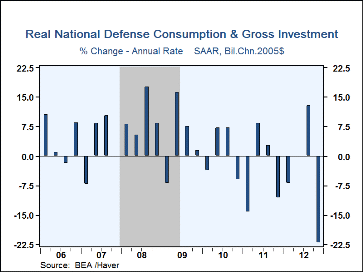 Growth in domestic final sales was reduced by a
6.6% decline (-1.7% y/y) in government spending. Outlays were lowered by a
22.2% drop (-5.0% y/y) in defense spending.
Offsetting the decline was a 2.2% rise (1.9% y/y) in personal consumption
expenditures. That was fueled by a more-than one quarter gain (9.2% y/y)
in outlays on motor vehicles. Spending on home furnishings & durable
household equipment rose 4.2% (4.4% y/y) but apparel consumption slipped
0.4% (+1.4% y/y). Services outlays rose just 0.9% (1.2% y/y). Business
investment recovered at an 8.4% rate (4.3% y/y) after its moderate Q3
decline. Residential investment also was strong, rising at a 15.3% rate
(14.4% y/y).
Growth in domestic final sales was reduced by a
6.6% decline (-1.7% y/y) in government spending. Outlays were lowered by a
22.2% drop (-5.0% y/y) in defense spending.
Offsetting the decline was a 2.2% rise (1.9% y/y) in personal consumption
expenditures. That was fueled by a more-than one quarter gain (9.2% y/y)
in outlays on motor vehicles. Spending on home furnishings & durable
household equipment rose 4.2% (4.4% y/y) but apparel consumption slipped
0.4% (+1.4% y/y). Services outlays rose just 0.9% (1.2% y/y). Business
investment recovered at an 8.4% rate (4.3% y/y) after its moderate Q3
decline. Residential investment also was strong, rising at a 15.3% rate
(14.4% y/y).
The foreign trade sector acted as a drag on overall economic growth. The 0.3 percentage point subtraction from GDP growth was due to a 5.7% decline (+1.4% y/y) in exports which was accompanied by a lesser 3.2% drop (+0.5% y/y) in imports.
Price inflation moderated substantially last quarter as the chain type price index rose at a 0.6% (1.7% y/y) annual rate. That gain was the weakest in a year. For the whole the chain type price index grew 1.8% after a 2.1% rise in 2011. Domestic prices, however, rose at a steady 1.3% clip (1.5% y/y) last quarter (1.5% y/y). The index rose 1.7% for the full year, down from the 2.5% rise in 2011.
The latest GDP figures can be found in Haver's USECON and USNA databases; USNA contains basically all of the Bureau of Economic Analysis' detail on the national accounts, including the new integrated economics accounts and the recently added GDP data for U.S. Territories. The Consensus estimates can be found in AS1REPNA.
| Chained 2005 $, %, AR | Q4'12 | Q3'12 | Q2'12 | Y/Y | 2012 | 2011 | 2010 |
|---|---|---|---|---|---|---|---|
| Gross Domestic Product | -0.1 | 3.1 | 1.3 | 1.5 | 2.2 | 1.8 | 2.4 |
| Inventory Effect | -1.3 | 0.7 | -0.5 | -0.4 | 0.2 | -0.2 | 1.5 |
| Final Sales | 1.1 | 2.4 | 1.7 | 1.9 | 2.0 | 2.0 | 0.9 |
| Foreign Trade Effect | -0.3 | 0.4 | 0.2 | 0.2 | 0.1 | 0.2 | -0.4 |
| Domestic Final Sales | 1.3 | 1.9 | 1.4 | 1.7 | 1.9 | 1.8 | 1.3 |
| Demand Components | |||||||
| Personal Consumption | 2.2 | 1.6 | 1.5 | 1.9 | 1.9 | 2.5 | 1.8 |
| Business Fixed Investment | 8.4 | -1.8 | 3.6 | 4.3 | 7.7 | 8.6 | 0.7 |
| Residential Investment | 15.3 | 13.6 | 8.4 | 14.4 | 11.9 | -1.4 | -3.1 |
| Government Spending | -6.6 | 3.9 | -0.7 | -1.7 | -1.7 | -3.1 | 0.6 |
| Chain-Type Price Index | |||||||
| GDP | 0.6 | 2.7 | 1.6 | 1.7 | 1.8 | 2.1 | 1.3 |
| Final Sales of Domestic Product | 0.6 | 2.8 | 1.5 | 1.7 | 1.8 | 2.1 | 1.3 |
| Final Sales to Domestic Purchasers | 1.3 | 1.5 | 0.7 | 1.5 | 1.7 | 2.5 | 1.6 |
Tom Moeller
AuthorMore in Author Profile »Prior to joining Haver Analytics in 2000, Mr. Moeller worked as the Economist at Chancellor Capital Management from 1985 to 1999. There, he developed comprehensive economic forecasts and interpreted economic data for equity and fixed income portfolio managers. Also at Chancellor, Mr. Moeller worked as an equity analyst and was responsible for researching and rating companies in the economically sensitive automobile and housing industries for investment in Chancellor’s equity portfolio. Prior to joining Chancellor, Mr. Moeller was an Economist at Citibank from 1979 to 1984. He also analyzed pricing behavior in the metals industry for the Council on Wage and Price Stability in Washington, D.C. In 1999, Mr. Moeller received the award for most accurate forecast from the Forecasters' Club of New York. From 1990 to 1992 he was President of the New York Association for Business Economists. Mr. Moeller earned an M.B.A. in Finance from Fordham University, where he graduated in 1987. He holds a Bachelor of Arts in Economics from George Washington University.


